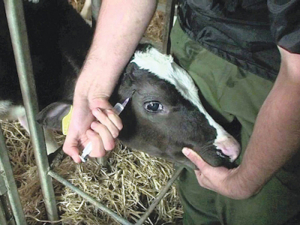NZVA urges animal owners to help fight antibiotic resistance through preventative care
Animal owners can help protect life-saving antibiotics from resistant bacteria by keeping their animals healthy, says the New Zealand Veterinary Association.
 90% of pet owners trust their vet teams to make the best choices for their animals, and the same proportion believe vets are important to New Zealand society.
90% of pet owners trust their vet teams to make the best choices for their animals, and the same proportion believe vets are important to New Zealand society.
Around 97% of New Zealand pet owners value the care provided by their vet teams, but the broader contribution of animal health professionals to society often goes unseen, a new study has revealed.
The survey, carried out by Boehringer Ingelheim in partnership with the New Zealand Veterinary Association (NZVA) and the New Zealand Veterinary Nursing Association (NZVNA), asked more than 600 pet owners about their views. It found that 90% trust their vet teams to make the best choices for their animals, and the same proportion believe vets are important to New Zealand society.
However, fewer than one in four respondents were fully aware of the scope of what veterinary professionals contribute beyond the clinic. While many recognised the significance of clinical care, fewer knew about the profession’s work in areas such as public health, biosecurity, on-farm consultancy, animal welfare policy, and education. More than a third of pet owners admitted they had no awareness at all of veterinary contributions outside pet care.
Richard Duckworth, Head of Companion Animal, Boehringer Ingelheim New Zealand, says the results reflect an opportunity to raise the profile of veterinary professionals and better highlight the scale of their impact.
“People trust their vets, but they don’t always see the work happening behind the scenes,” he said.
“Vets help prevent disease, plan for emergencies, and support farms and public safety. Their work goes far beyond the clinic and this survey reinforces the importance of bringing those contributions to light.”
The research also revealed that public perceptions of the profession do not always align with its day-to-day realities. While nearly half (45%) of pet owners believe veterinarians enjoy a good work-life balance, only 63% acknowledged that the job requires high levels of emotional resilience, a figure significantly lower than that attributed to doctors or police officers. The demands of the job, both emotional and physical, are often underestimated.
Laura Harvey, President of the NZVNA, says these findings mirror the experience of many in the field.
“Veterinary nurses and allied veterinary professionals bring deep clinical expertise and extraordinary care to the job, but the expectations placed on them can be immense. Supportive regulation, stronger professional development, and increased recognition are critical if we want people to stay in the profession long term.”
This survey comes after Boehringer Ingelheim’s Taking Animal Health Forward 2024 whitepaper, which highlighted retention concerns across the sector. That report found that only 40% of veterinarians and just 265 of veterinary nurses expected to remain in the profession until retirement.
Kevin Bryant, Chief Executive of the NZVA, says for vets and their teams, hours are long, working conditions can be challenging, and stress levels are high.
“Showing our professionals that they are valued, can help. This is important in both companion animal clinics and rural practices.
“New Zealand’s primary sector-based economy depends hugely on the contribution of vets and their teams to keep farm animals healthy and protect biosecurity. The scientific and policy contributions that these professionals make across animal welfare, biodiversity and community wellbeing also fly under the radar. It’s important that policy-makers understand and support veterinary professionals in all their many and varied roles.”
To support the findings, Boehringer Ingelheim has developed a campaign that highlights just how much Kiwis value their vet teams. The video aims to prompt conversation and encourage awareness of the essential service provided by veterinary sector.
Norwood has announced the opening of a new Tasman dealership at Richmond near Nelson next month.
Buying or building a rural or semi-rural property? Make sure you know where the wastewater goes, says Environment Canterbury.
With collars on more than seven million cows worldwide, Nedap says its standalone launch into New Zealand represents world-leading, reliable and proven smart technology solutions for dairy farmers.
The Meat Industry Association (MIA) is once again looking for game-changing ideas for New Zealand's red meat processing and exporting sector.
Environment Southland is inviting feedback on two bylaws that play a critical role in safeguarding the region's waterways and ensuring the safety of the local community.
While the North Island is inundated with rain, Southland is facing receding water levels as warm weather and lack of rainfall continues.

OPINION: Meanwhile, red blooded Northland politician Matua Shane Jones has provided one of the most telling quotes of the year…
OPINION: This old mutt has been around for a few years now and it seems these ‘once in 100-year’ weather…